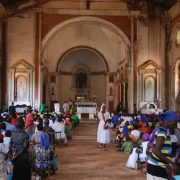The agreement between China and the Holy See, signed last September 22 was not going to be a walk in the park, as Americans would put it, and recent developments in the difficult diocese of Qiqihar prove the point.
There some local authorities, against the intentions of central and provincial authorities, were trying to divide up the diocese and push priests for some kind of new registration.
At the same time, some priests were refusing to talk to the authorities and also rebuffedurges to listen to the Qiqihar bishop Wei (whose message is below).
Higher Chinese authorities and Bishop Wei however managed to solve the small crisis and brought the situation back to normal.
This incident proves that the application of the agreement in many places will meet snags and hurdles, because it goes against decades of practice and interests of both some local officials and some priests who would like to remain “underground”.
The agreement is in fact a new burden for some local officials who reasonably want to carry on with things like in the past, don’t want new and difficult tasks, because now they are asked to change and increase a dialogue and understanding. The same is true for some priests, who had, again reasonably, found a space where they could live well enough and now they are asked to change their old ways and increase a dialogue both with their bishop and with local authorities.
In this case the case of Bishop Wei is interesting. He is still not officially recognized by the Chinese authorities, hecould be still considered “underground”, but he is actively working with officials and other priests, both officially recognized or not.
Therefore, the application of the agreement is bound to be hard in some places, and everybody concerned, in or out of China, is asked and will be asked to convertfrom their old visions, and approaches and increase a dialogue with the authorities but also with their fellow priests. All involved are asked to do their best, have an open heart and try to face this historical moment.
Without an open heart all the catholic world, which is looking at China and the application of the agreement with hope and great expectations, could be disappointed. Perhaps it is our duty to try not to disappoint anybody. But we need to strive every day, because the Pope has asked us so and we also believe this effort can be of great help for the good of China.
We need support for this effort and we thank everybody for the help in understanding and improving the situation.
* Zhu Changyou is Diocesan Administrator of Jilin Diocese.
Notice of the diocese of Qiqihar of the Roman Catholic Church
Called by God, as the Bishop of Qiqihar Diocese, in response to the Church’s internal disorder and for the benefit of the people of God as well, I issue the following notice:
- In 2002, the Holy See divided Heilongjiang province into Qiqihar Diocese, Harbin Missionary District, Jiamus Prefecture. I was appointed as the Bishop of Qiqihar Diocese; therefore, I am the only Bishop to legally and validly carry out the Episcopal ministries within the Diocese of Qiqihar. (Qiqihar Diocese covers the Prefectures of Qiqihar,Daqing, Suihua, Heihe, Daxinganling, and Hulunbeier Prefecture of Inner Mongolia).
- I have learned that some faithful have been mistakenly circulating the news that the Pope had appointed Bp. Yue Fusheng as the Bishop of the “Heilongjiang Diocese” and causing confusion as a result. We have learned from an online letter from the Secretary of the State Cardinal Parolin and Prefect of the Propaganda Fide Cardinal Filoni to Bishop Yue Fusheng on December 7, 2018, that Bishop Yue Fusheng was “the Bishop in Heilongjiang” and had no authority to govern Qiqihar Diocese.
- Only with the authorization of this bishop, the priests working in the Diocese of Qiqihar can legally and validly administer sacraments. The priests who carry out pastoral activities within Qiqihar Diocese without the authorization of this bishop would have no status of a parish priest, and sacraments of marriage, confirmation are invalid, nor do they have authority to waive the restrictions on marriage.
- Some priests, with the reason to insist on being ‘underground Church’, disobey the Bishop and dissociate himself from me. These priests have no right to minister the faithful, and the sacraments of confession, confirmation, and marriage they administer shall be considered invalid.
- Any priests who carry out pastoral activities within the jurisdiction of Qiqihar Diocese without the authorization of this bishop must apply for authorization from me prior to April 21, 2
Wei Jingyi, vescovo di Qiqihar
Han Wen Min, Ammnistratore Diocesano
24 gennaio 2019.





